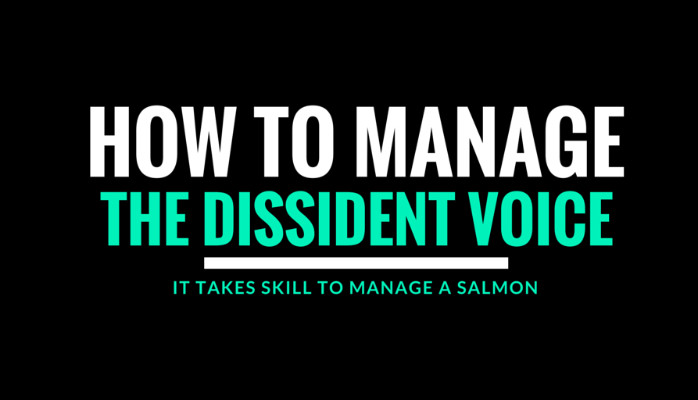Last week I wrote about why people go against the grain. One of my points was that it takes skill and perseverance (and maybe courage) to go against the current and be salmon. Someone asked me how to manage someone who does not easily goes with the flow. The point was that it equally takes skill and perseverance to manage that kind of person. That is true. Here’s an answer to that comment.
It takes skill and perseverance to manage a salmon.
Involvement and Disagreement
A Leader creates movement. He or she wants people move in a certain direction. People explicitly or implicitly decide to move or not. Some people agree immediately with the vision. Others don’t. There might be resistance. The way to overcome resistance is to involve people as early as possible. Without involvement there is no movement.
But people disagree. They disagree with established visions. They disagree with change. And they give voice to their disagreement. They are the dissidents. The word dissident comes from the Latin word dissidere. It literally means to sit apart. Most leaders do not like dissidents. They oppose to a desired vision or ideological system. They give leaders the feeling of a pebble in the shoe. You can walk, but it hurts. And so most leaders want to get rid of the dissidents, because their voice weakens their authority. Here you can find a list of dissidents. Even Jesus Christ is on that list.
The Value of the dissident Voice
But think again. Dissident voices are valuable. It’s worth while to listen to them. Why?
- Dissident voices make you think. They actually make you better. You can use the opportunity of dissidence to re-explain? You can use the energy of the dissident to strengthen your arguments.
- Dissidents may be right in their criticism and ideas. You should acknowledge that. Blend their ideas in the vision and decisions. In that way a dissident is an ally.
- Allowing for people to voice their thoughts and emotions creates an atmosphere of openness and security.
- A dissident voice leads to change.
- A dissident voice allows you to check.
How many dissident voices can you tolerate? And for how long? Should you not just decide and get on with it? Is a dissident voice not a nuisance that hinders efficiency?
The trick is to look for the dissident voice as early as possible and continuously. It is OK to voice concerns. You’d better take those concerns into consideration when possible. And when concerns are not taken into account, you can explain why.
Managing the dissident Voice
There’s a thin line between speaking up and complaining all the time. It’s difficult for a leader to assess whether possible expressions of concern are genuine. They can also be just expressions of a negative personality. Ask people to identify with the purpose of the company. There is hardly any compromise possible about the values of a company. You need to be clear about what the company expects and what you can offer. Be ready to explain the reasons why of decisions taken. And there are things you can do to manage the dissident voice.
- Check if people in your company dare to speak up.
- See that there is a culture that supports dialogue.
- Make sure there are processes in place that encourage people to voice their ideas.
- Actively look for the dissident voices, before you take a (final) decision. Don’t assume anything.
- Question yourself when hearing a dissident voice. Does it bother you? How do you feel? Listening to your emotions gives a lot of information about the dissident voice itself.
- Show how you deal with the dissident ideas. You can adapt or enrich the vision. Reprisals are never a good idea. You have to give a least some genuine feedback.
- When there is a decision, be clear about what you expect from anyone. Point out that the focus is on execution. The only reason to question the decision is when there is feedback that shows it does not work out as planned. But that’s not dissidence.
- There are people who keep on voicing their dissident ideas. You must make them aware of the consequences of their behavior. Check their intentions.
A dissident voice is a source of leadership.
The dissident Voice as an Ally
As a leader, you can decide to crush the dissident voice. That is generally not a good idea. You do not need people around you who agree with you all the time. You need people who think and add value to the decision. Leaders that dismiss the dissident voice miss out on valuable advice. Involving this voice adds value to leadership. Even more, it can become a source of leadership. Do not forget. People speaking up usually do it for a good purpose. It requires courage. They intend to make you better, not weaker. So see them as an ally and not as an adversary. And one more thing.
Never call someone dissident because of his or her dissident voice. That spoils everything.

